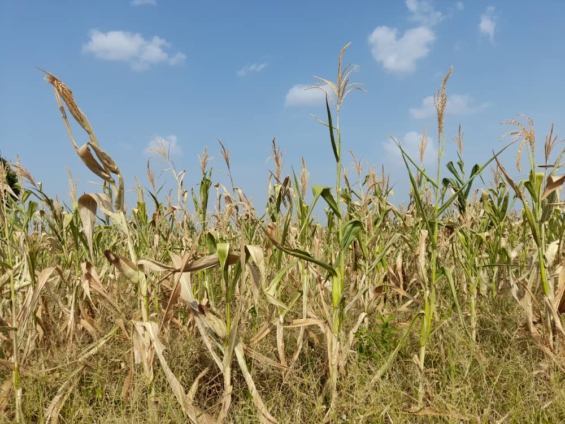AGRA yesterday launched its new five-year strategy that helps governments tackle hunger and enhance nutrition by building resilient food systems.
The need for this support is highlighted by a decade of multiple natural and man-made crises. To help articulate the evolved emphasis of the strategy, AGRA today also unveiled a refreshed branding.
AGRA’s new strategy is a response to recent global and African catastrophes including famine, COVID-19, drought, fall army worm, climate change, soaring food, fertilizer and energy prices, and the conflict in Ukraine.
These events have created a truly urgent need for rapid strengthening of food systems and accelerated transformation of agriculture. The new strategy will build on AGRA’s achievements to date, and crucially the lessons it has learned with its partners.
In the strategic period 2017-21, AGRA’s direct contributions have included:
- 11 million farmers reached directly
- 26 million farmers reached through policy, state capability and partnerships work
- facilitated 42 policy reforms
- supported 11 national flagships
- catalyzed $1.4 billion in investment
- 33,000 village-based advisors trained
- 75% of AGRA farmers adopted fertilizer use
- 48% of AGRA farmers adopted improved seed
- 60% adopted post-harvest practices
Despite this progress, Africa’s food systems urgently need further radical transformation. Many countries still struggle to achieve food security and provide diverse, nutritious choices for their populations.
Supply chains that bring food to markets are often long and fragmented, leading to significant waste and higher costs for consumers. This is exacerbated by climate change and environmental degradation that threatens livelihoods, biodiversity and sustainability across much of the continent’s agricultural sector.
“We have demonstrated that when farmers have access to choices of inputs and when those inputs give a clear yield differential farmers adopt and their lives change. We have also seen that this only happens sustainably when markets are available to farmers,” said AGRA’s President, Dr. Kalibata.
“Our new strategy therefore will see us do more of what works for farmers and will see us trying to understand markets better. In all this we must bring more youth, more nutrition and be smarter in use of environmental resources” she added.
AGRA’s new strategy, which will run from 2023-27 at the cost of $550 million, concentrates on key areas of work from our last strategy, including seed system development, and government engagement, expands AGRA’s work in sustainable farming and markets and trade, and focuses on three critical areas of change: climate change, gender, youth and inclusion work, and transforming African diets.
Overview of focus areas and targets:
1. Working with smallholder farmers - AGRA will aim to reach 28 million farmers in 15 countries to enable their full participation in sustainably growing Africa’s food systems.
2. Developing seed systems – We will build on the ten countries where AGRA has strengthened seed systems to ensure farmers gain access to affordable, productive, climate/pest resistant seeds.
3. Sustainable farming – AGRA has set a goal of 30 percent of targeted farmers to adopt sustainable farming practices that build livelihoods today, and protect the environment for tomorrow.
4. Inclusive markets and trade – AGRA will invest $300M through AGRA platforms to enhance market competitiveness for farmers, while bringing nutritious food to consumers.
5. Policy and state capability – We will support 12 countries to develop strategies and investment plans for food system transformation pathways, that create an environment where farming businesses thrive.
6. Inclusivity – Our new strategy will see a 25 percent increase in funding for women-led SMEs, which will create new opportunities for women and youth to thrive in farming.
7. Nutrition – AGRA’s new strategy aims to support targeted farmers to adopt improved varieties including climate smart and nutrient dense varieties, to provide affordable, diverse, and nutritious diets for consumers.
8. Climate adaptation – We aim to help 40% of targeted farmers to adopt varieties including climate smart/nutrient dense varieties.
The new Strategy also speaks to the need for businesses to recognize growth opportunities and have the confidence, financing, and capabilities to serve farmers, trade produce, and process food profitably.
Government representatives, NGOs, companies, small holder farmers, traders and all those involved in the growing, processing and distribution of food in Africa gathered in Kigali this week at the annual summit of the AGRF.
AGRA continues to explore new partnerships as it prepares to implement its new strategy.
“AGRA is a proudly African institution,” stated AGRA’s Board Chairman, H.E. Hailemariam Dessalegn.
“To work sustainably and inclusively, food systems need to be built on solid foundations,” explained H.E. Dessalegn. “Together in partnership, we can transform our agriculture; protect our environment; create equitable prosperity; and feed our communities and families.”
Latest Stories
-
Legal Aid Commission employees threaten strike over poor working conditions
33 seconds -
Ghana ranked 7th globally as biggest beneficiary of World Bank funding
10 mins -
IMF board to disburse $360m to Ghana in December after third review
15 mins -
Former Bono Regional NPP organiser donates 13 motorbikes to 12 constituencies
21 mins -
Securities industry: Assets under management estimated at GH¢81.7bn in quarter 3, 2024
25 mins -
Gold Fields Ghana Foundation challenges graduates to maximise benefits of community apprenticeship programme
2 hours -
GBC accuses Deputy Information Minister Sylvester Tetteh of demolishing its bungalow illegally
2 hours -
Boost for education as government commissions 80 projects
2 hours -
NAPO commissions library to honour Atta-Mills’ memory
3 hours -
OmniBSIC Bank champions health and wellness with thriving community walk
3 hours -
Kora Wearables unveils Neo: The Ultimate Smartwatch for Ghana’s tech-savvy and health-conscious users
3 hours -
NDC supports Dampare’s ‘no guns at polling stations’ directive
3 hours -
Police officer interdicted after video of assault goes viral
3 hours -
KNUST’s Prof. Reginald Annan named first African recipient of World Cancer Research Fund
3 hours -
George Twum-Barimah-Adu pledges inclusive cabinet with Minority and Majority leaders
4 hours

